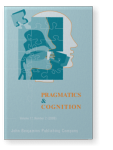Vol. 17:2 (2009) ► pp.356–382
Semantic prime HAPPEN in Mandarin Chinese
In search of a viable exponent
HAPPEN is a member of the Natural Semantic Metalanguage (NSM) inventory of primes (cf. Goddard and Wierzbicka (eds) 1994, 2002). Its English exponent ‘happen’ has been popularly expounded as fa1sheng1 in Mandarin Chinese (e.g., Chappell 2002). This article argues that fa1sheng1 is not the correct exponent of HAPPEN as it is marked for ‘adversity’ as well as what I call ‘serious mention’ or ‘noteworthiness’ of the event, i.e., that an event is sufficiently serious or noteworthy to fare a mention. This article puts forward you3 lit. ‘have, exist, happen’ and zen3(me)yang4/zhe4(me)yang4 lit. ‘like how/like this’ instead, as allolexic exponents of HAPPEN in Mandarin Chinese. Though highly polysemous each in its own way, the HAPPEN sense of you3 and zen3(me)yang4/zhe4(me)yang4 can, respectively, be shown to be semantically irreducible and pragmatically neutral. This article delineates some of the syntactic and contextual distribution attesting to the viability of you3 and zen3(me)yang4/zhe4(me)yang4 as expounding HAPPEN.
Cited by
Cited by 3 other publications
This list is based on CrossRef data as of 9 june 2024. Please note that it may not be complete. Sources presented here have been supplied by the respective publishers. Any errors therein should be reported to them.
